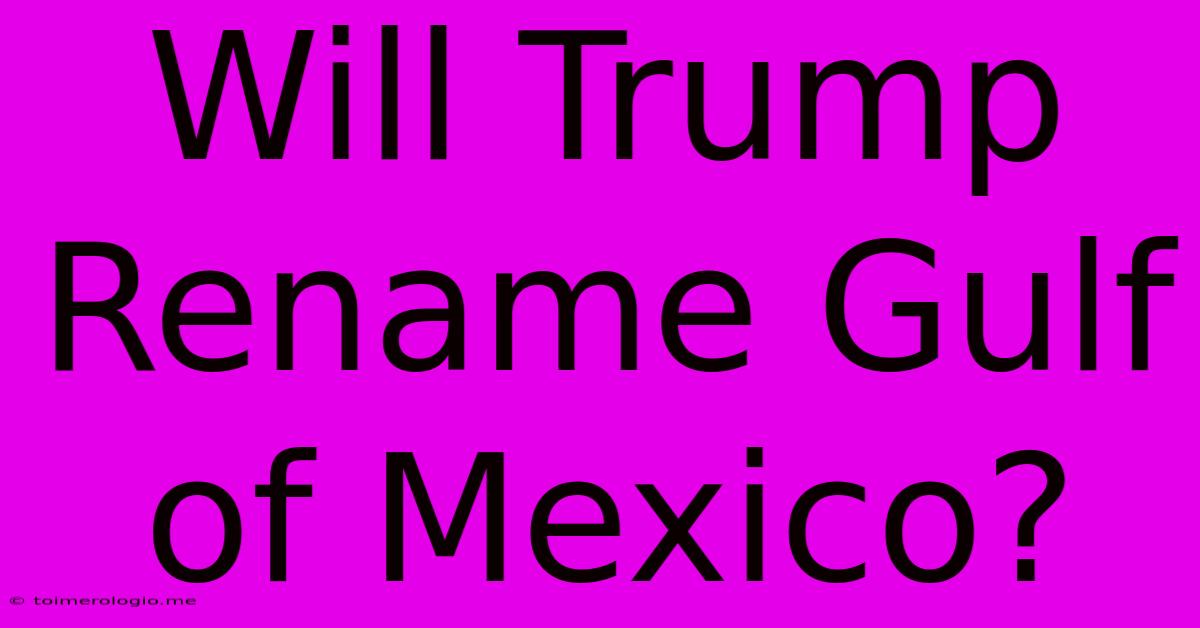Will Trump Rename Gulf Of Mexico?

Discover more detailed and exciting information on our website. Click the link below to start your adventure: Visit Best Website toimerologio.me. Don't miss out!
Table of Contents
Will Trump Rename the Gulf of Mexico? Unpacking the Speculation and the Power of Names
The question, "Will Trump rename the Gulf of Mexico?" might seem outlandish at first glance. Yet, considering former President Donald Trump's penchant for bold pronouncements and reshaping of established norms, the idea isn't entirely far-fetched to some. This article delves into the speculation surrounding a potential renaming, exploring the historical context, the political implications, and the very real power names hold in shaping our understanding of geography and history.
The Speculative Roots: Why the Question Arises
The speculation around a potential renaming isn't rooted in any official statement or policy proposal from Trump himself. Instead, it stems from a combination of factors:
-
Trump's Populist Appeal and Nationalistic Rhetoric: Throughout his presidency, Trump frequently employed strong nationalistic rhetoric and appealed to a populist base. Such rhetoric often involved a perceived rejection of established norms and a desire to reassert American dominance. A renaming, however audacious, would fit neatly within this narrative.
-
Historical Precedents (Though Limited): While renaming major geographical features is uncommon, it's not unprecedented. There are historical examples of places being renamed to reflect political shifts or to erase previous associations. This precedent, however limited, fuels the speculative flames.
-
The Power of Symbolic Gestures: For many, a name is more than just a label; it's a symbol representing history, culture, and identity. A renaming wouldn't just change a label on a map; it would be a powerful symbolic gesture, potentially viewed as an act of reclaiming national identity or asserting dominance.
Examining the Practical Challenges: Why Renaming is Unlikely
While the speculation is intriguing, numerous practical and political challenges make a Trump-initiated renaming of the Gulf of Mexico highly improbable:
-
International Agreements and Treaties: The Gulf of Mexico borders several countries, including Mexico, Cuba, and various Central American nations. Renaming such a significant body of water would require extensive international negotiations and agreements, something that's highly unlikely to occur unilaterally. International consensus on such a matter would be extremely difficult to achieve.
-
Legal and Administrative Hurdles: The process of officially renaming a geographical feature is complex and involves various legal and administrative bodies. Overturning established nomenclature requires a significant amount of bureaucratic effort and legal justification, making a swift and unilateral renaming highly improbable.
-
Public Opinion and Backlash: A significant portion of the American public, as well as international communities, likely would oppose a unilateral renaming initiative. The potential for significant public backlash and international condemnation would be a major deterrent.
-
Scientific and Cartographic Conventions: Geographic names are governed by established conventions and standards maintained by organizations like the United States Board on Geographic Names. Deviating from these established norms would create chaos and confusion across various sectors.
The Deeper Meaning: The Power of Names and National Identity
Even if the likelihood of a renaming is slim, exploring the question allows us to examine the deeper issues at play: the power of names and their role in shaping national identity.
-
Names as Carriers of History and Culture: The very name "Gulf of Mexico" reflects a historical relationship between the region and Mexico. Changing this name would essentially be attempting to rewrite history, erasing a significant cultural and geographical link.
-
National Identity and Geopolitical Positioning: The use of names in geopolitical contexts often reflects a nation's perception of its place in the world. While some might see renaming as an assertion of national power, others view it as a potentially aggressive and disruptive act.
-
The Role of Language and Cultural Representation: Language plays a crucial role in shaping perceptions of place and culture. The question of renaming the Gulf of Mexico touches upon broader issues of language, cultural representation, and the historical narratives embedded within geographical names.
Conclusion: More Than Just a Name
While the prospect of Trump renaming the Gulf of Mexico remains highly unlikely, the question itself opens a rich discussion about the significance of names, national identity, international relations, and the potential pitfalls of unilateral actions. It underscores the fact that names are not merely labels; they are powerful symbols laden with historical, cultural, and political meaning. The enduring power of these symbols, and the careful consideration they deserve, should always remain at the forefront of any debate regarding geographic nomenclature. Ultimately, the question “Will Trump rename the Gulf of Mexico?” serves as a catalyst for a much broader conversation about the importance of names in shaping our perception of the world and our place within it. The debate will continue to spark discussions on national identity, international cooperation, and the complex relationship between language, power, and geography.

Thank you for visiting our website wich cover about Will Trump Rename Gulf Of Mexico?. We hope the information provided has been useful to you. Feel free to contact us if you have any questions or need further assistance. See you next time and dont miss to bookmark.
Also read the following articles
| Article Title | Date |
|---|---|
| Bezos Partner Draws Trump Ire | Jan 23, 2025 |
| Controversy Surrounds Lauren Sanchez | Jan 23, 2025 |
| Sanchez In White At A Trump Function | Jan 23, 2025 |
| Meet Jd Vances Family | Jan 23, 2025 |
| Analyzing Usha Vances Inauguration Dress | Jan 23, 2025 |
